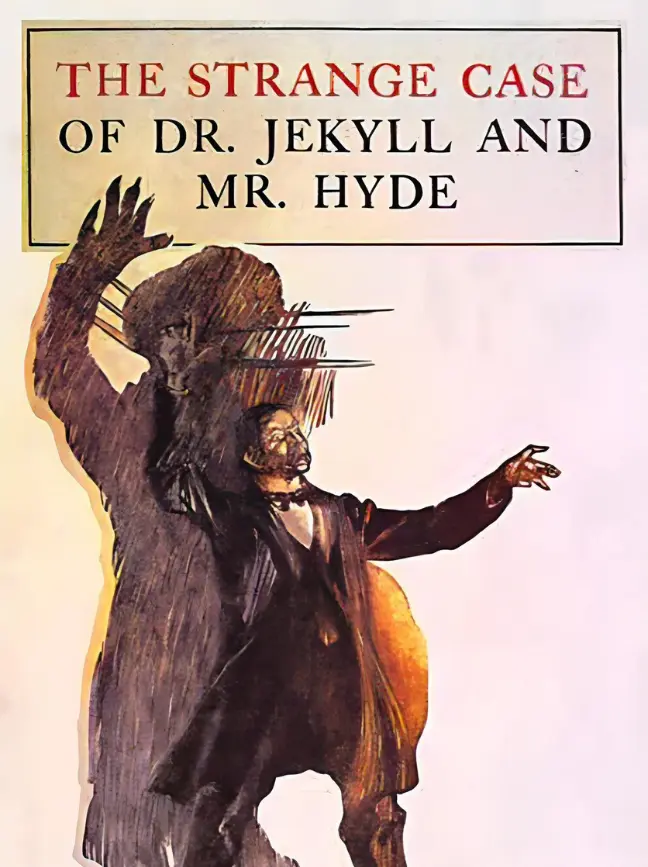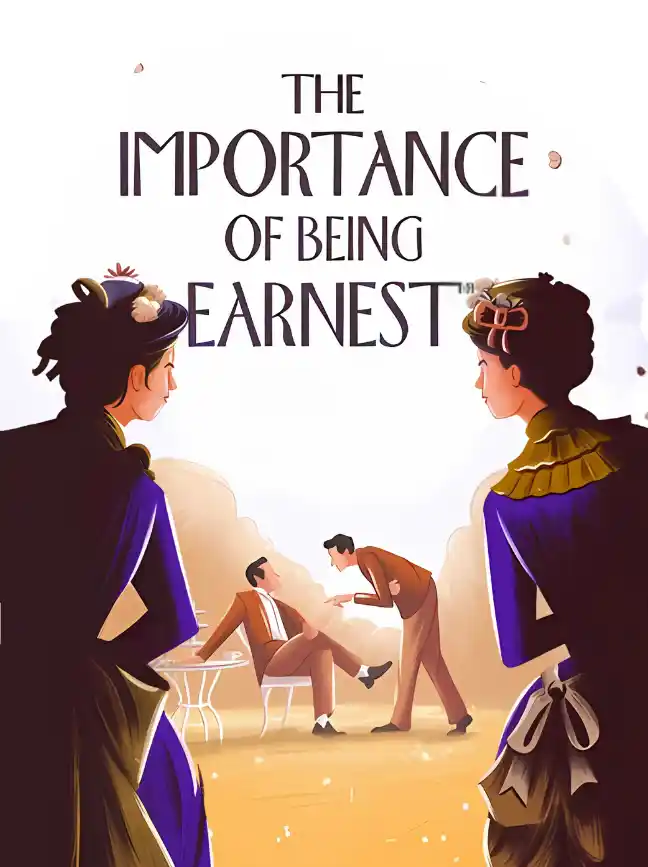“WA-A-A-A! Waa-a-a-
aaa!”
Frank Gordins set down his coffee cup so hard that it spilled over into the saucer.
“Is there no way to stop that child crying?” he demanded.
“I do not know of any,” said his wife, so definitely and politely that the words seemed cut off by machinery.
“I do,” said his mother with even more definiteness, but less politeness.
Young Mrs. Gordins looked at her mother-in-law from under her delicate level
brows, and said nothing. But the weary lines about her eyes deepened; she had been kept awake nearly all night, and for many nights.
So had he. So, as a matter of fact, had his mother. She had not the care of the baby
—but lay awake wishing she had.
“There’s no need at all for that child’s crying so, Frank. If Julia would only let me
——”
“It’s no use talking about it,” said Julia. “If Frank is not satisfied with the child’s
mother he must say so— perhaps we can make a change.”
This was ominously gentle. Julia’s nerves were at the breaking point. Upon her tired ears, her sensitive mother’s heart, the grating wail from the next room fell like a lash—burnt in like fire. Her ears were hypersensitive, always. She had been an ardent musician before her marriage, and had taught quite successfully on both piano and violin. To any mother a child’s cry is painful; to a musical mother
it is torment.
But if her ears were sensitive, so was her conscience. If her nerves were weak her pride was strong. The child was her child, it was her duty to take care of it, and take care of it she would. She spent her days in unremitting devotion to its needs, and to the care of her neat flat; and her nights had long since ceased to refresh her.
Again the weary cry rose to a wail.
“It does seem to be time
for a change of treatment,” suggested the older woman acidly.
|
“Or |
a |
change |
of |
|
residence,” |
offered |
the |
|
|
younger, in voice. |
a deadly |
quiet |
|
|
“Well, |
by |
Jupiter! |
|
There’ll be a change of some kind, and p.d.q.!” said the son and husband, rising to his feet.
His mother rose also, and left the room, holding her head high and refusing to show any effects of that last thrust.
Frank Gordins glared at his wife. His nerves were raw, too. It does not benefit any one in health or character to be continuously deprived of sleep. Some enlightened persons use that deprivation as a form of torture.
She stirred her coffee with mechanical calm, her eyes sullenly bent on her plate.
“I will not stand having Mother spoken to like that,” he stated with decision.
“I will not stand having her interfere with my
methods of bringing up children.”
“Your methods! Why, Julia, my mother knows more about taking care of babies than you’ll ever learn! She has the real love of it—and the practical experience. Why can’t you let her take care of the kid— and we’ll all have some peace!”
She lifted her eyes and looked at him; deep inscrutable wells of angry light. He had not the faintest appreciation of her state of
mind. When people say they are “nearly crazy” from weariness, they state a practical fact. The old phrase which describes reason as “tottering on her throne,” is also a clear one.
Julia was more near the verge of complete disaster than the family dreamed. The conditions were so simple, so usual, so inevitable.
Here was Frank Gordins, well brought up, the only son of a very capable and idolatrously affectionate
mother. He had fallen deeply and desperately in love with the exalted beauty and fine mind of the young music teacher, and his mother had approved. She too loved music and admired beauty.
Her tiny store in the savings bank did not allow of a separate home, and Julia had cordially welcomed her to share in their household.
Here was affection, propriety and peace. Here was a noble devotion on the part of the young wife, who so worshipped her husband
that she used to wish she had been the greatest musician on earth—that she might give it up for him! She had given up her music, perforce, for many months, and missed it more than she knew.
She bent her mind to the decoration and artistic management of their little apartment, finding her standards difficult to maintain by the ever- changing inefficiency of her help. The musical temperament does not always include patience;
nor, necessarily, the power of management.
When the baby came her heart overflowed with utter devotion and thankfulness; she was his wife—the mother of his child. Her happiness lifted and pushed within till she longed more than ever for her music, for the free pouring current of expression, to give forth her love and pride and happiness. She had not the gift of words.
So now she looked at her husband, dumbly, while wild
visions of separation, of secret flight—even of self- destruction—swung dizzily across her mental vision. All she said was “All right, Frank. We’ll make a change. And you shall have—some peace.”
“Thank goodness for that, Jule! You do look tired, Girlie—let Mother see to His Nibs, and try to get a nap, can’t you?”
“Yes,” she said, “Yes I
think I will.” Her voice had a peculiar note in it. If Frank had been an alienist, or even
a general physician, he would have noticed it. But his work lay in electric coils, in dynamos and copper wiring—not in woman’s nerves—and he did not notice it.
He kissed her and went out, throwing back his shoulders and drawing a long breath of relief as he left the house behind him and entered his own world.
“This being married—and bringing up children—is not what it’s cracked up to be.” That was the feeling in the
back of his mind. But it did not find full admission, much less expression.
When a friend asked him, “All well at home?” he said, “Yes, thank you—pretty fair. Kid cries a good deal— but that’s natural, I suppose.”
He dismissed the whole matter from his mind and bent his faculties to a man’s task—how he can earn enough to support a wife, a mother, and a son.
At home his mother sat in her small room, looking out
of the window at the ground- glass one just across the “well,” and thinking hard.
By the disorderly little breakfast table his wife remained motionless, her chin in her hands, her big eyes staring at nothing, trying to formulate in her weary mind some reliable reason why she should not do what she was thinking of doing. But her mind was too exhausted to serve her properly.
Steep—sleep—sleep— that was the one thing she
wanted. Then his mother could take care of the baby all she wanted to, and Frank could have some peace…. Oh, dear! It was time for the child’s bath.
She gave it to him mechanically. On the stroke of the hour she prepared the sterilized milk, and arranged the little one comfortably with his bottle. He snuggled down, enjoying it, while she stood watching him.
She emptied the tub, put the bath apron to dry, picked up all the towels and
sponges and varied appurtenances of the elaborate performance of bathing the first-born, and then sat staring straight before her, more weary than ever, but growing inwardly determined.
Greta had cleared the table, with heavy heels and hands, and was now rattling dishes in the kitchen. At every slam the young mother winced, and when the girl’s high voice began a sort of doleful chant over her work, young Mrs. Gordins rose to her feet with a shiver,
and made her decision.
She carefully picked up the child and his bottle, and carried him to his grandmother’s room.
“Would you mind looking after Albert?” she asked in a flat, quiet voice; “I think I’ll try to get some sleep.”
“Oh, I shall be delighted,” replied her mother-in-law. She said it in a tone of cold politeness, but Julia did not notice. She laid the child on the bed and stood looking at him in the same dull way for a little while, then went out
without another word.
Mrs. Gordins, senior, sat watching the baby for some long moments. “He’s a perfectly lovely child!” she said softly, gloating over his rosy beauty. “There’s not a thing the matter with him! It’s just her absurd ideas. She’s so irregular with him! To think of letting that child cry for an hour! He is nervous because she is. And of course she couldn’t feed him till after his bath—of course not!”
She continued in these
sarcastic meditations for some time, taking the empty bottle away from the small wet mouth, that sucked on for a few moments aimlessly, and then was quiet in sleep.
“I could take care of him so that he’d never cry!” she continued to herself, rocking slowly back and forth. “And I could take care of twenty like him—and enjoy it! I believe I’ll go off somewhere and do it. Give Julia a rest. Change of residence, indeed!”
She rocked and planned, pleased to have her grandson with her, even while asleep.
Greta had gone out on some errand of her own. The rooms were very quiet. Suddenly the old lady held up her head and sniffed. She rose swiftly to her feet and sprang to the gas jet—no, it was shut off tightly. She went back to the dining- room—all right there.
“That foolish girl has left the range going and it’s blown out!” she thought, and went to the kitchen. No, the
little room was fresh and clean, every burner turned off.
“Funny! It must come in from the hall.” She opened the door. No, the hall gave only its usual odor of diffused basement. Then the parlor—nothing there. The little alcove called by the renting agent “the music room,” where Julia’s closed piano and violin case stood dumb and dusty—nothing there.
“It’s in her room—and she’s asleep!” said Mrs.
Gordins, senior; and she tried to open the door. It was locked. She knocked—there was no answer; knocked louder—shook it—rattled the knob. No answer.
Then Mrs. Gordins thought quickly. “It may be an accident, and nobody must know. Frank mustn’t know. I’m glad Greta’s out. I must get in somehow!” She looked at the transom, and the stout rod Frank had himself put up for the portieres Julia loved.
“I believe I can do it, at a
pinch.”
She was a remarkably active woman of her years, but no memory of earlier gymnastic feats could quite cover the exercise. She hastily brought the step- ladder. From its top she could see in, and what she saw made her determine recklessly.
Grabbing the pole with small strong hands, she thrust her light frame bravely through the opening, turning clumsily but successfully, and dropping
breathlessly and somewhat bruised to the floor, she flew to open the windows and doors.
When Julia opened her eyes she found loving arms around her, and wise, tender words to soothe and reassure.
“Don’t say a thing, dearie
—I understand. I understand
I tell you! Oh, my dear girl
—my precious daughter! We haven’t been half good enough to you, Frank and I! But cheer up now—I’ve got the loveliest plan to tell you
about! We are going to make a change! Listen now!”
And while the pale young mother lay quiet, petted and waited on to her heart’s content, great plans were discussed and decided on.
Frank Gordins was pleased when the baby “outgrew his crying spells.” He spoke of it to his wife.
“Yes,” she said sweetly. “He has better care.”
“I knew you’d learn,” said he, proudly.
“I have!” she agreed. “I’ve learned—ever so much!”
He was pleased too, vastly pleased, to have her health improve rapidly and steadily, the delicate pink come back to her cheeks, the soft light to her eyes; and when she made music for him in the evening, soft music, with shut doors—not to waken Albert—he felt as if his days of courtship had come again.
Greta the hammer-footed had gone, and an amazing
French matron who came in by the day had taken her place. He asked no questions as to this person’s peculiarities, and did not know that she did the purchasing and planned the meals, meals of such new delicacy and careful variance as gave him much delight. Neither did he know that her wages were greater than her predecessors. He turned over the same sum weekly, and did not pursue details.
He was pleased also that his mother seemed to have
taken a new lease of life. She was so cheerful and brisk, so full of little jokes and stories—as he had known her in his boyhood; and above all she was so free and affectionate with Julia, that he was more than pleased.
“I tell you what it is!” he said to a bachelor friend. “You fellows don’t know what you’re missing!” And he brought one of them home to dinner—just to show him.
“Do you do all that on
thirty-five a week?” his friend demanded.
“That’s about it,” he answered proudly.
“Well, your wife’s a wonderful manager—that’s all I can say. And you’ve got the best cook I ever saw, or heard of, or ate of—I suppose I might say—for five dollars.”
Mr. Gordins was pleased and proud. But he was neither pleased nor proud when someone said to him, with displeasing frankness, “I shouldn’t think you’d
want your wife to be giving music lessons, Frank!”
He did not show surprise nor anger to his friend, but saved it for his wife. So surprised and so angry was he that he did a most unusual thing—he left his business and went home early in the afternoon. He opened the door of his flat. There was no one in it. He went through every room. No wife; no child; no mother; no servant.
The elevator boy heard him banging about, opening
and shutting doors, and grinned happily. When Mr. Gordins came out Charles volunteered some information.
“Young Mrs. Gordins is out, Sir; but old Mrs. Gordins and the baby— they’re upstairs. On the roof, I think.”
Mr. Gordins went to the roof. There he found his mother, a smiling, cheerful nursemaid, and fifteen happy babies.
Mrs. Gordins, senior, rose to the occasion promptly.
“Welcome to my baby- garden, Frank,” she said cheerfully. “I’m so glad you could get off in time to see it.”
She took his arm and led him about, proudly exhibiting her sunny roof- garden, her sand-pile, and big, shallow, zinc-lined pool; her flowers and vines, her see-saws, swings, and floor mattresses.
“You see how happy they are,” she said. “Celia can manage very well for a few moments.” And then she
exhibited to him the whole upper flat, turned into a convenient place for many little ones to take their naps or to play in if the weather was bad.
“Where’s Julia?” he demanded first.
“Julia will be in presently,” she told him, “by five o’clock anyway. And the mothers come for the babies by then, too. I have them from nine or ten to five.”
He was silent, both angry and hurt.
“We didn’t tell you at first, my dear boy, because we knew you wouldn’t like it, and we wanted to make sure it would go well. I rent the upper flat, you see—it is forty dollars a month, same as ours—and pay Celia five dollars a week, and pay Dr. Holbrook downstairs the same for looking over my little ones every day. She helped me to get them, too. The mothers pay me three dollars a week each, and don’t have to keep a nursemaid. And I pay ten dollars a week board to
Julia, and still have about ten of my own.”
“And she gives music lessons?”
“Yes, she gives music lessons, just as she used to. She loves it, you know. You must have noticed how happy and well she is now— haven’t you? And so am I. And so is Albert. You can’t feel very badly about a thing that makes us all happy, can you?”
Just then Julia came in, radiant from a brisk walk, fresh and cheery, a big
bunch of violets at her breast.
“Oh, Mother,” she cried, “I’ve got tickets and we’ll all go to hear Melba—if we can get Celia to come in for the evening.”
She saw her husband, and a guilty flush rose to her brow as she met his reproachful eyes.
“Oh, Frank!” she begged, her arms around his neck. “Please don’t mind! Please get used to it! Please be proud of us! Just think, we’re all so happy, and we
earn about a hundred dollars a week—all of us together. You see I have Mother’s ten to add to the house money, and twenty or more of my own!”
They had a long talk together that evening, just the two of them. She told him, at last, what a danger had hung over them—how near it came.
“And Mother showed me the way out, Frank. The way to have my mind again—and not lose you! She is a different woman herself now
that she has her heart and hands full of babies. Albert does enjoy it so! And you’ve enjoyed it—till you found it out!
“And dear—my own love
—I don’t mind it now at all! I love my home, I love my work, I love my mother, I love you. And as to children
—I wish I had six!”
He looked at her flushed, eager, lovely face, and drew her close to him.
“If it makes all of you as happy as that,” he said, “I guess I can stand it. ”
And in after years he was heard to remark, “This being married and bringing up children is as easy as can be
—when you learn how!”






